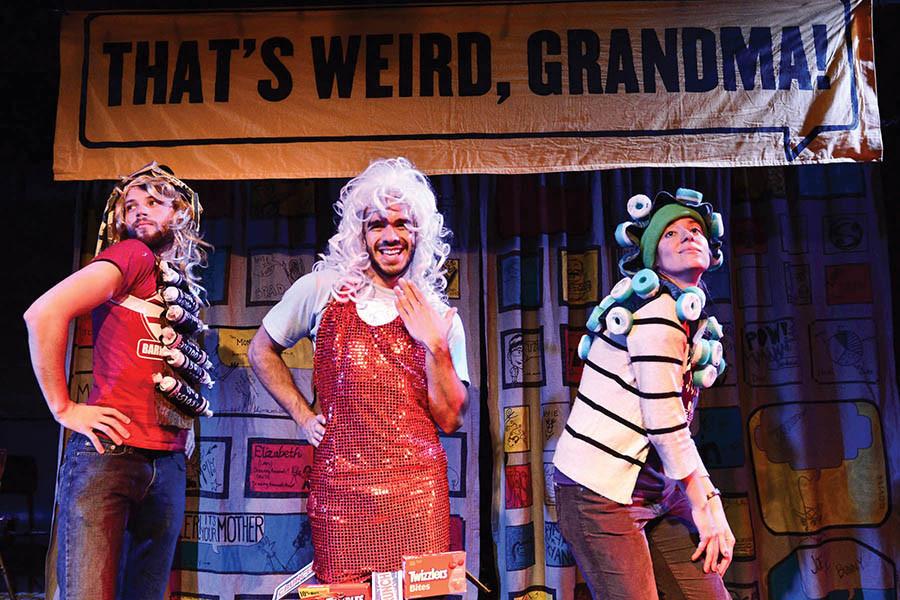Northwestern alumnus directs adaptations of stories by Chicago Public Schools students
Brandon Cloyd (Communication ‘07) performs in a Barrel of Monkey’s Matinee performance. He will direct a new round of the company’s matinees which opens Feb. 14.
January 28, 2016
A&E
A Chicago theater company hopes to break down socioeconomic barriers by working with Chicago Public Schools students one story at a time.
The company, Barrel of Monkeys, will present its latest series of Sunday matinee performances, directed by Brandon Cloyd (Communication ‘07), starting Feb. 14. The series, titled “That’s Weird Grandma: Winter Wonderland Matinees,” features a variety of professional sketches and songs all adapted from CPS students’ original stories.
“It is a collaboration that doesn’t exist anywhere else,” Musical Director Gwen Tulin said. “Especially in a time in a Chicago where we are so divisive, this is an example of no matter what neighborhood or background, we can make something that is truly joyous.”
The upcoming series will feature light-hearted sketches — like the story of a character made of bacon who is getting an F- on his report card — with more serious numbers, like one featuring a ballet dancer running through the snow, Cloyd said.
Music will be intertwined throughout the show in various styles depending on what the musicians choose to do in adapting the stories.
“It’s been an incredible community to be involved in,” Cloyd said. “Not just for work, but socially, too. I’m constantly being challenged by my peers and fellow actors to try new things and take risks. It’s the type of company you join, catch the bug and stick with it.”
Cloyd said he first heard about Barrel of Monkeys in a Northwestern theater class as an undergraduate student and thought it sounded like an interesting opportunity. He said he then saw a Barrel of Monkeys show and was very impressed, inspiring him to take more classes involving storytelling and children’s theater. Once he graduated, he was set on the idea of working with education and theater, Cloyd said.
Cloyd joined Barrel of Monkeys in 2007 as a performer and has remained with the organization in various positions ever since. This is his first time directing a round of the company’s matinee series, which has run year-round for the past 15 years, except for a brief break this month.
Since its founding in 1997, Barrel of Monkeys has worked in 60 CPS schools with a focus on the creative process in the classroom. More than 8,000 lower-income elementary school students have participated in its programs, which offer them a chance for creative expression in the form of storytelling.
“We work mostly on Chicago’s West and South sides,” said Artistic Director Joseph Schupbach. “We’ve worked at some schools for 10 to 15 years. It is important for us to give a voice to young people who may not have a platform.”
The company holds creative writing workshops in third to fifth grade classrooms and requires students to write several stories. By the end of a season of workshops, students altogether will have written around 900 stories, Schupbach said. It is up to the teachers and performers to narrow down these stories to around 20 to be adapted and performed.
The stories are then presented in different art forms in school shows or public shows, like “That’s Weird Grandma.” Although general artistic interpretations may vary, the artists and performers in the ensemble try to stay as true as possible to the original story, Cloyd said.
“In the rehearsal room, all of the actors and the director will gather around the stories,” Cloyd said. “Someone who is a dancer might take a piece and say, ‘I might change this into a ballet number.’ A musician might take something and make it into a rap or hip-hop piece.”
One great thing about the program is that many of the teachers are also performers, Cloyd said. Because of their closeness to the classrooms, the teachers are able to tell the other actors about the kids so they adapt with an insight into their personality, he added.
Everyone, from clowns to musicians to improvisers to dancers, contributes to the program’s work. These professional artists make the stories written by elementary school students accessible to anyone, no matter their age, Schupbach said.
“One of the funniest things about coming to the matinees is that there are a ton of kids in the audience,” he said. “It’s fun for adults to be in the room, hearing the voices of kids (cheering). There is an automatic connective between the audience, child and the child’s work on stage.”
Email: [email protected]
Twitter: @amandasvachula


